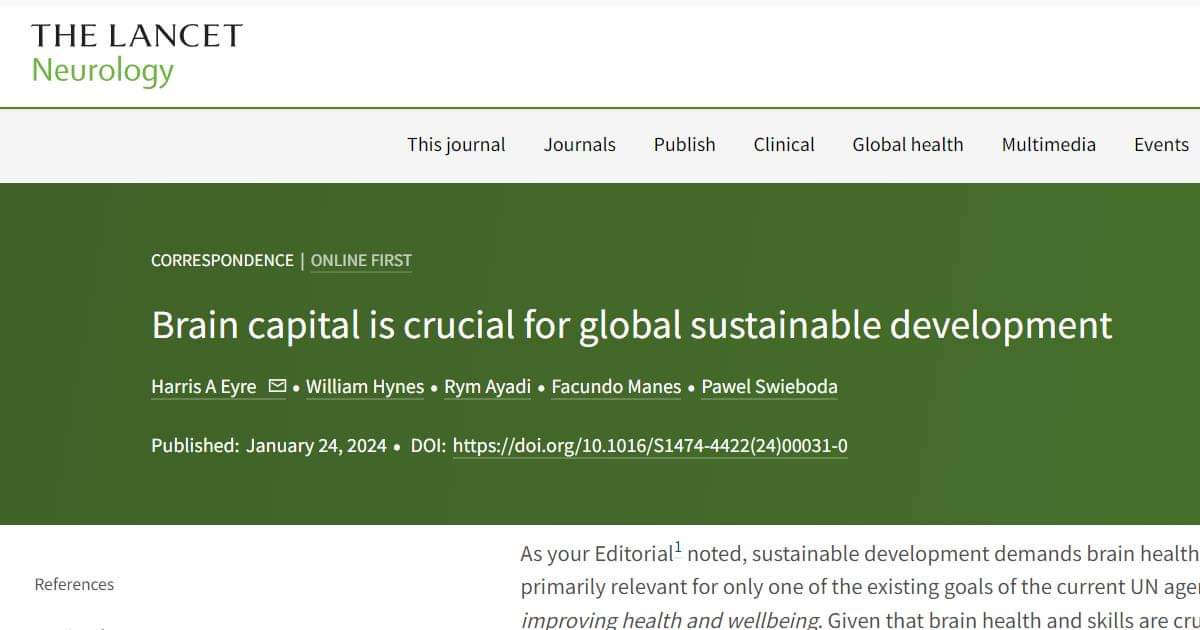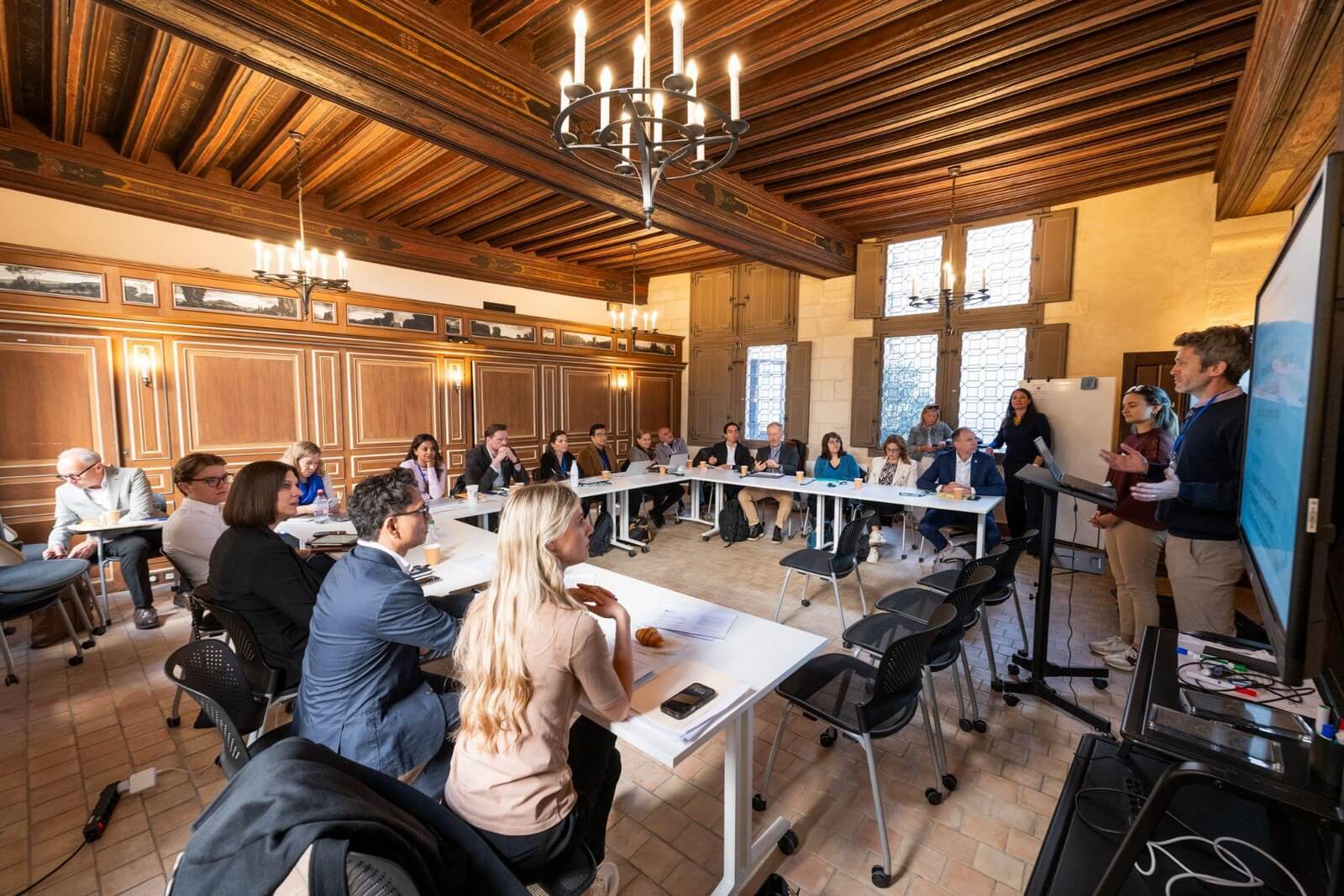Basel, Switzerland, January 25, 2024: The Brain Capital Alliance has outlined in a letter to Lancet Neurology how brain capital, an economic asset integrating brain health and skills, is vital to the United Nations’ (UN) post-Sustainable Development Goal (SDG) agenda. Brain capital offers a new approach to centralizing human contributions to the economy.
Rym Ayadi PhD, sustainability economist and finance professor leading the Euro-Mediterranean Economists Association, noted, ‘Understanding the intricacies of the human brain is paramount in addressing global societal challenges. As we unravel the complexities of our cognitive processes, we unlock new paradigms and ways of thinking, essential for driving innovative and sustainable advancements in our economies. The brain sciences hold the key to revolutionizing how we approach problem-solving, creativity, and decision-making, paving the way for a future where economic development is in harmony with the well-being of society and the environment.’ Ayadi is a Senior Advisor for the Center for European Policy Studies (CEPS) and was a coauthor on the Lancet Neurology paper.
The report notes how brain capital uniquely connects and fuses disciplines, offering a common goal for collaboration across public and private sectors and all SDG themes.
Jakob Skaarup Nielsen, CEO of Healthcare Denmark, noted ‘In Denmark, the public-private partnership ‘Lighthouse Life Science’ with the participation of Novo Nordisk and Lundbeck was, in the wake of COVID-19, initiated by the government to both address healthcare challenges (chronic disease and mental health issues), and at the same time stimulate economic growth through new innovative partnerships across sectors and boundaries’. This model cuts across many SDGs aligning with promoting good health and well-being (SDG 3), advancing decent work and economic growth (SDG 8), fueling industry, innovation and infrastructure (SDG 9), reducing inequality (SDG 10), and enriching partnerships (SDG 17).
Upali Nanda PhD, Partner and Global Director of Research at HKS Inc, a global architecture firm, noted, ‘The opportunity to design our cities, workplaces, learning environments and homes, to support brain capital could transform human and planet health in a fiscally responsible and experientially responsive way’.
Massamba Thioye PhD, Project Executive of the Global Innovation Hub at the UN’s Framework Convention on Climate Change (UNFCCC), noted, ‘The transition to a regenerative and empowering economy, able to provide flourishing life to the many people and meet the needs of the planet, necessitates the accessibility of transformative climate and sustainability technologies, policy instruments and financial instruments but also change in our lifestyles as well as new patterns of working together. Outer actions that can effectively enable that transition require inner development: the development of the brain capital and the development of the heart capital. Therefore, innovations in these two domains are integral parts of the climate and sustainability innovation ecosystems, alongside innovative technologies, policy instruments, financial instruments, business models, products from the culture and creative industry. Only a systemic innovation process, that can provide a co-creation space to all the stakeholders relevant to these different components of the innovation cluster, can drive that transition’.
Coauthors of the Lancet Neurology paper also included: Harris A. Eyre MD PhD, Fellow with Rice University’s Baker Institute for Public Policy and Senior Fellow with the Meadows Mental Health Policy Institute, William Hynes, adjunct professor with University College London and the Santa Fe Institute, Hon Facundo Manes MD, Founder of the INECO Foundation and Argentine Congressman, and Pawel Swieboda, Founder of Neurocentury and Senior Visiting Fellow with the European Policy Centre.
Letters published in the Correspondence section represent the views of the authors and not necessarily the views of The Lancet journals. Letters to the Editor are not normally externally peer reviewed.
The roadmap will be launched today at an event of the European Brain Council, Brain Health for Society: Insights from Brain Capital, in collaboration with Rice University’s Baker Institute for Public Policy and the Brain Capital Alliance. Register for the live stream here: https://crm.braincouncil.eu/civicrm/event/info?reset=1&id=79
The Lancet Neurology paper is here: Eyre HA, Hynes W, Ayadi R, Manes F, Swieboda P (2024) Brain capital: vital to the post-SDG agenda. Lancet Neurology. https://www.thelancet.com/journals/laneur/article/PIIS1474-4422(24)00031-0/fulltext





